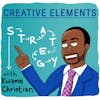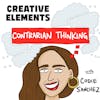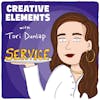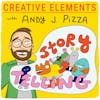
#23: Kwame Christian – How an expert negotiator thinks strategically about expanding his reach
Play EpisodeKwame Christian is one of the foremost experts in the field of negotiation and conflict resolution.
Kwame Christian is one of the foremost experts in the field of negotiation and conflict resolution. He’s the Director of the American Negotiation Institute, the host of the Negotiate Anything podcast, and the author of Finding Confidence in Conflict: How to Negotiate Anything and Live Your Best Life. In this episode we talk about Kwame’s brief look into politics, how to lead negotiations, thinking long term, taking risks, how he manages his time, and why Strategy has been at the heart of all of his decisions.
Transcript and show notes can be found here.
***
LISTENER SUPPORT
Join our community on Facebook
Support this show through Buy Me A Coffee.
***
SPONSORS
Try Podia and save 15% for life as a Creative Elements listener
Start your free trial of SavvyCal and get your first month free using promo code ELEMENTS
ABOUT JAY CLOUSE
Subscribe to my weekly newsletter
Enroll in my course on podcasting, Podcast Like The Pros
***
PODGLOMERATE NETWORK
This show is a part of the Podglomerate network, a company that produces, distributes, and monetizes podcasts. We encourage you to visit the website and sign up for our newsletter for more information about our shows, launches, and events. For more information on how The Podglomerate treats data, please see our Privacy Policy.
Since you're listening to Creative Elements, we'd like to suggest you also try other Podglomerate shows surrounding entrepreneurship, business, and careers like Rocketship.fm and Freelance to Founder.
Learn more about your ad choices. Visit megaphone.fm/adchoices
Kwame Christian 0:00
You have to be willing to lead that conversation. And not only would that lead to better outcomes just from a negotiation perspective, but it will make them more easily persuadable because they see you as that authority figure.
Jay Clouse 0:13
Welcome to Creative Elements, a show where we talk to your favorite creators and learn what it takes to make a living from your art and creativity. I'm your host, Jay Clouse. Let's start the show.
Jay Clouse 0:39
Hello, my friend. It's that time again, it's time for another episode of Creative Elements. I'm grateful to be spending time with you here today. Thank you for tuning in. I think you're going to be really glad that you clicked play on this episode. I've never read the book Cat's Cradle by Kurt Vonnegut. But at some point, I was introduced to a concept in that book that has really stuck with me for like 10 years, the term is Karass k a r a s s. It's a made up term from a made up religion in the book called Bokonism. Vonnegut describes a karass as a group of people linked in a cosmically significant manner, even when superficial linkages are not evident. Maybe you've noticed in your own life, that there seems to be a handful of people who you see all the time and seem to keep running into even though you aren't necessarily in the same social circles or even in the same line of work. I know this sounds a little woowoo. But this idea has stuck with me, like I said, For almost 10 years, and all this to say, today's guest is one of those people who seems to be in a Karass with me. Kwame Christian is one of the foremost experts in the field of negotiation and conflict resolution. He's the director of the American Negotiation Institute, the host of the Negotiate Anything podcast and the author of Finding Confidence in Conflict, how to negotiate anything and live your best life. Kwame's Negotiate Anything podcasts has more than 1.5 million downloads. His book was an Amazon bestseller, and he conducts both workshops and keynote speeches all over the world. And recently, Kwame published two courses on LinkedIn learning called How to have difficult conversations about race at work, and Driving change and anti racism within your organization. But Kwame wasn't always so comfortable with conflict. In his very popular 2017 TEDx talk, Kwame talks about how he himself became more confident in conflicts. After a conversation with a mentor.
Kwame Christian 2:40
He said Kwame, there is a big difference between being liked and being respected. And if you want to have personal and professional success, you need to be willing to engage with conflict. So after that meeting, I forced myself to have the difficult conversations that I spent my whole life trying to avoid. And as I built this new habit, I discovered something life changing. Conflict is an opportunity. Conflict provides you with the unique opportunity to either repair and strengthen valuable relationships or identify and remove malignant relationships with minimal damage. So how do we actually engage with the conflict at hand? You remember fight, flight or freeze. I suggest that we use a more evolved response to conflict resolution, something that I like to call compassionate curiosity.
Jay Clouse 3:42
You may still be wondering why I brought up the whole karass in Kurt Vonnegut thing. Kwami lives in Columbus, Ohio, where I also happen to live. When I was an undergrad at Ohio State back in 2011. I was a communications intern at The Ohio State Moritz College of Law at the same time that Kwame was getting his law degree. I would constantly come across Kwame's name and his work while I wrote for the law school. And then on March 11 2017, yes, I know this exact date because I looked it up in my calendar, Kwame and I had our first actual face to face conversation. It was a casual meeting for coffee at a local coffee shop. And neither of us really had much of an agenda or reason for a meeting, we just realized that we had a lot of mutual friends. Towards the end of that conversation, Kwame turned his compassionate curiosity towards me and asked what I was working on. I told him that I wanted to quit my job and start my own business. I just wasn't really sure what I wanted to do. And kind of offhand, he said to me, if I had your network, I would facilitate mastermind groups. I had no idea what a mastermind group was. So he explained to me, I'm a lawyer. I meet with a handful of other lawyers a couple times each month and we help each other grow our business. I literally took that advice and I ran with it. The next month. I I quit my job. A month after that I was facilitating my first mastermind group under my own business Unreal Collective. And since that time, I've worked with 25 different groups of entrepreneurs through the Unreal Collective accelerator program. More than 100 entrepreneurs have worked through that program now. It has been the core of my business since going out on my own in 2017. We've only really chatted a couple times since then. And so I was really excited to get on the mics with Kwame and catch up here for this podcast, because he has come a long way since then too. In this episode, we talked about qualities brief look into politics, how to lead negotiations, thinking long term, taking risks, how he manages his time, and why strategy has been at the heart of all of his decisions. I absolutely love this conversation and the clarity of thought that Kwame brings to it and I think that you will too. So I'd love to hear your thoughts on this episode, send me a message on Twitter or on Instagram @JayClouse, let me know you're listening. And be sure to join the Creative Elements listener group on Facebook, where I'll be sharing some of Kwame's best resources throughout the week. But without further ado, let's hear from Kwame.
Kwame Christian 6:15
Unlike the majority of my friends, I did not want to be a practicing lawyer. That was not really the goal for me. So my, my undergrad degrees in psychology, and so psychology major minor in foundations of law and Spanish. I wanted to be a clinical psychologist, initially, that's what I wanted to do. I love psychology, because I like to help people. And so I said, Okay, you know what, I'm thinking a little bit more strategically about this. I can help more people. If I get into politics, and then if I can change policy, then I help a broader swath of people. So let's go that route. So I switched directions and decided to go into law school so I went to law school and then got my Master of Public Policy at the same time, and as I started to learn more about law policy and in particular, politics, the more I started to fall out of love with it, because I said, I can't accept this lifestyle, I would have to sacrifice too much of what I care about my morals in order to be successful here. And I wouldn't want to do that to my family, seeing how it tears people apart. It's just not a lifestyle that I want to live. And so I found myself graduated to advanced degrees, being sworn in after passing the bar asking myself what I want to be when I grow up.
Jay Clouse 7:32
I can't resist diving into that a little bit deeper. Can you talk about what you learned as you got closer to politics that made you think this actually won't let me create the change that I wanted to create?
Kwame Christian 7:41
Yeah, here's the thing. I love chess. I love playing chess. I'm obsessed. I mean, 13,000 games of online chess on chess.com type of obsessed and I had to ask myself, do I want to be a powerful chess piece? Or do I want to be the chess master or I want to be the chess player, well, if you're on the board, you're always in danger. And no matter how high you go in the political ranks, you're still being manipulated by somebody who's more powerful, but who has the safety off of the board. And I recognize that no matter how high I got, I'm still not. I'm still really not the king, even if you get that title. also recognizing that in America, it's a binary choice, Democrat, Republican. I don't have many friends who fit very nicely into either party, and I'm not one of them either. But I would have to sacrifice a part of myself in order to swear allegiance to a team that I don't fully subscribe to. And I was really into this I entered in at the State Senate, and I would every day every day during school, I would listen to an hour of like MSNBC, an hour of Fox News and an hour of NPR to try to get something close to the middle. So figure out what was going on. Yeah, and then I realized this is ridiculous. I couldn't I couldn't do it. Anyway. was actually a trip to Costa Rica that really opened my eyes to help me to see what what the reality was.
Jay Clouse 9:07
Wow. Okay, so you you put all this time and even resources into going to law school your thought is I'm going to go into politics. I'm guessing as you're getting close to the end of law school or after you graduate from law school, you know, you said you had to figure out what you wanted to be when you grew up. How did you start to parse through that after so much investment in this path?
Kwame Christian 9:26
Yeah. So it was interesting. I stumbled upon negotiation in law school. And I think that might have been really the first exposure I had to the concept really on a deep level. And I just happened to take a course because it fit into my schedule. And I fell in love because it was the first time I really saw psychology very clearly. It was psychology applied for a legal or business purpose. So I became obsessed. And so after the course, we had a negotiation competition. I didn't even know at the time that OSU was the second rank to dispute resolution program in the country. No clue. I just, I really stumbled into it.
Jay Clouse 10:02
Also the best synchronized swimming team in the country.
Kwame Christian 10:04
Are you serious?
Jay Clouse 10:05
Yeah.
Kwame Christian 10:05
That's crazy. I didn't know that. That's wild. So So yeah, we they had this competition and negotiation competition. I didn't know that we had, you know, you have mock trial. They also have mock negotiations. So we did the negotiation competition, me and a partner and we won the competition and more. It's Ohio State College of Law. And that gave us the opportunity to represent the school at regionals in Ottawa, Ontario. And we won that competition as well. And then we made it to the semi finals of the national competition in New Orleans. And so after that, I was just hooked. I said, I don't know what it is that I'm going to do specifically, but I know that negotiation is going to be a big part of it. And the thing that was so interesting to me was that, and I talked about this in my TED talk, and in my book, I'm a recovering people pleaser. My family's from the Caribbean. So I had a strong Caribbean accent when I was growing up. So not only did I look different, I also sounded different. And not surprisingly, this combination made real tough for the young boy to fit in. So because of this, I became obsessed with finding ways to gain the acceptance of my peers. And eventually, I became one of the most popular kids in school. But this came with a price. I became deathly afraid of saying, or doing something that could potentially jeopardize the relationships that I worked so hard to create. I became a people pleaser. And this made it less likely for me to stand up for myself in difficult conversations. In other words, I would freeze or flee in the face of conflict. This led me to agree when I actually disagree and avoid confrontation at all costs. I was really, really bad at conflict resolution and to recognize that it was it wasn't a talent. It was a skill that could be nurtured and improved upon. It was mind blowing to me and uhm recognizing that other people would struggle in this type of way. I wanted to share this skill set with as many people as I could. So I knew that was the trajectory. I just needed to figure out how to get there.
Jay Clouse 12:11
As I get older, I have that same realization about so many things of about this. Oh, wait is something that I can learn is something about getting older, we just forget the process of learning and that unnecessary part of that process is being really bad at the beginning. We just have like no willingness to be bad at something.
Kwame Christian 12:30
Yeah. It reminds me of the book I think Angela Duckworth of Mindset. Whether it's the fixed no Carol Dweck, Angela Duckworth is Grit. So, yeah, the growth mindset versus fixed mindset. And what's really interesting is that sometimes we can have that growth mindset in specific areas of our life, but also have a fixed mindset and another area and we need to do a little bit of introspection to recognize that potential barrier that we're creating for ourselves by not appreciate The fact that we can improve if it's something that's necessary in order to get to where we want to go.
Jay Clouse 13:05
So you're recognizing that you have the struggle of conflict resolution, and yet you're winning these negotiation competitions. Now that you have the benefit of a lot of years of study of negotiation. Have you kind of pinpointed What made you so effective early on? And what maybe was intuitive that you were doing really well?
Kwame Christian 13:23
Yeah, I think it was the fear of performing poorly, that forced me to prepare at a higher level. There's a study out of the Thunderbird School of Management, where they did a study of 230 mock negotiations, and they separated it where the control group, they read the prompt and then they just negotiated with the experimental group, what they did is they took the time to prepare thoroughly, and then they negotiated and the differences between those two groups is that the group that took the time to prepare, they were able to generate 11% more value for themselves and at the same time, 6% more value for the other side. And so they were able to Create a better deal for themselves. But other people enjoyed negotiating with them because they were collaborative and creative and created value for them too. And think about that. No new skills, no skills, no tactics. And that alone helped them to improve. And so for us with me and my partner, Chris, we just practice and practice and practice and I think we just outworked everybody else. And it really showed when it came time to perform.
Jay Clouse 14:25
I love that you said that. And I don't want to spend a ton of time talking about the tactics in negotiation on the show. But a lot of people listening to this are creatives they're freelancing. And when I tell so many freelancers is, if you're going to go into talking about a project or a contract negotiation, you need to think about what you want and what you're willing to walk away from, because so many people go into these negotiations with no idea what they actually want, how they're going to present their argument for it, and they walk away with something they're unhappy with. And I think it just comes down to preparation. Maybe you can expand on that a little bit.
Kwame Christian 14:59
Absolutely. And before I forget, let me say this, I have a free gift for your audience too. It's a just a treasure trove of preparation guides and negotiation guides. So if you go to AmericanNegotiationInstitute.com, you can get access to over 15 different negotiation guides, a regular business preparation guide that you can use in any type of business negotiation, salary negotiation, introverts guide to negotiation, how to negotiate for a car, all of these things over 15. And you can get that and it'll help you to actually systematically prepare because sometimes you say, hey, prepare, like, okay, should I google something? What? What does that look like? And this walks you through what you should do. But yeah, Jay, you're absolutely right. The thing is, not all deals are meant to be made. And so I think about negotiation like, not not as the art of deal making, but as the art of deal discovery. We're going to have this conversation, we're going to see if there's a deal to be made. And if you take the time to prepare and then simply ask for more and do it in the right way. You can actually get more of what you want and strengthen the relationship at the same time. And when you think about what value we often leave on the table, once you open your eyes to the world of negotiation, you realize, Wow, my whole life, I could have just been getting more by asking, that's crazy. And that's why I call the show Negotiate Anything. Because I think the biggest barrier people have behind confidence when it comes to these difficult conversations is a lack of negotiation awareness, they don't recognize opportunities to negotiate and create more value in their lives.
Jay Clouse 16:31
Here's an abstract question. If people are kind of by default, unprepared, and ill prepared to go into these conversations and to discover the deal, that would mean that the person on the other side of the table probably is too and so going into it, I would assume with some preparation can really work in your favor because more chances are not maybe the other party hasn't done any of that work either.
Kwame Christian 16:54
100% and sometimes it's really obvious sometimes it is really obvious and I I tell people, the process of negotiation negotiating effectively often makes you the leader of the conversation. Not only do you have the initiative in the conversation where they're kind of responding to you, but you're actually showing them how they should comport themselves during the conversation, asking great questions, making sure you empathize those type of things. And the concept of reciprocity will lead them to reflect those same behaviors back to you. So even if they are not the high level negotiator you are after, you know, downloading those guides and checking out the podcast, you they will start to up their game based on what they're seeing from you.
Jay Clouse 17:40
I love that. You're just putting so much more structure and meaning behind some of this advice that I've intuitively found to work because similarly, when people hire a freelancer, they want to be led. They want you to be the expert in the process. They want you to get them to the outcome that they're hiring you for. And if you don't go into these conversations, willing to lead, willing to show here's how it's going to work, here's why it's going to work for you too. They don't get that feeling. And so they're not confident in hiring you.
Kwame Christian 18:08
Exactly. And when you think about the concept of authority, book reference, Robert Cialdini, Influence, it's persuasive. If you demonstrate that you have authority in your field, then people are going to be more persuaded by the things that you say. And that's why especially as freelancers it's important to lead the dance because they're hiring you for your expertise, expertise that they do not have. You have to be willing to lead that conversation. And not only would that lead to better outcomes, just from a negotiation perspective, but it will make them more easily persuadable because they see you as that authority figure.
Jay Clouse 18:43
After the break Kwame talks about his strategy for becoming a respected thought leader over the course of just a few years. So stick around and we'll be right back. Welcome back to Creative Elements. When we left off in Kwame's story he had ruled out politics, but had discovered a love of negotiation. So he began to create a new strategy for his career after law school.
Kwame Christian 18:56
Thinking back to strategy, what my strategy was for politics was, alright, I'm going to go to school, I'm going to get a nice job afterwards working at a law firm is going to get me a lot of respect. And then I'm going to run for the State Senate seat 15 district when I'm around 29 or 30. That was that was very, very targeted. And now that's gone. I'm like, what am I going to do? And then I look at the different negotiation experts out there, they have these books and these degrees and everything else, like well, I have degrees, I don't have a book. And the thing is, I'm really young. I graduated younger than most people. I remember spending, you know, about a month in solitude trying to grow a beard so people could respect me so I look a little bit older.
Jay Clouse 20:23
I've gone to that phase too.
Kwame Christian 21:35
Yeah and so um, I knew that I couldn't just come out of law school and say even with those accolades and say, Hey, I'm a negotiation expert, trust me. So I spent a little bit of time in just kind of thinking through what it was that I was going to do. So I did some civil rights work out of school, one of my professors hired me to do health equity and criminal justice work. So I did that. And then once I started to figure out what the plan was, the new plan was, then I started to make some moves. So this plan was to create my own law firm practice for about 10 years, and then say, hey, I've practiced so long now you can trust me as as a negotiation expert. And so I created my law firm while working full time and was seeing clients on the side eventually was able to transition. And then I just challenged myself I said, After starting to practice generating some income, doing okay, but really not enjoying it that much. I said to myself, well, what's stopping me from from doing it right now? Why not just do both at the same time, and so that's when in 2016, I started the podcast, Negotiate Anything and I said, Well, listen, I'm just going to do this. It'll be fun helped me to establish some credibility. And then through doing that, some people reached out and said, Hey, can you consult with us on this case? It's a multi million dollar deal. It was a lawyer out in Nevada. And he was telling me, he said, I've been practicing for about 28 years and the negotiation, the psychology side has always been a struggle for me. So I'd love to work with you. And as I'm listening to him, I'm saying to myself, I cannot believe this. I can never let him know that even though he's been practicing for 28 years. I've only been on this earth for 27 years. I can't let him know.
Jay Clouse 21:37
Oh, my gosh, and this guy came from listening to your podcast. Yep. This is another thing that I talked to freelancers about when when we get in our own heads and kind of have this almost imposter syndrome feeling of how could this person possibly be hiring me? It's because the skill they're hiring you for is just one skill and a collection of skills that makes up a human and you are better at that skill than them even though they may have 100 other skills that they have honed for 28 years and can teach you a lot about this one skill is why they're hiring you. And it's because you are better at this one skill.
Kwame Christian 22:09
Exactly, exactly.
Jay Clouse 22:11
So something that keeps standing out to me, and maybe it's related to your interest in strategy. You just mentioned that you plan to start your law firm and practice for 10 years. So that then you could talk about being a an expert of negotiation. Before that you were talking about this, this vision, the strategy of running for an elected office at a certain age, when and how did you pick up this long term view of how you're operating your life because we don't live in a culture or a society that really teaches you to think that long term.
Kwame Christian 22:44
Then Jay that's the thing. We have to take more control over our education. Because think about it. So I have three degrees. That's a lot people would say that, oh, Kwame, you're educated but here's the thing. For me, my real education started after law school, and so my goal usually in the years that it's not a pandemic, is to read a book a week, because then I'm in control of myself education. It's so obvious that people miss it. And so I like to talk about it almost in mystical terms. So imagine the people who you admire the most the smartest people in the world, and you could go to them. And then they give you this like glowing orb and they say, this glowing orb. This is my wisdom. This is everything I know, here, take it and put it inside yourself. And then you have it. Well, the thing is, that happens. And those things are called books. And they take the best of themselves, what they've learned through mistakes, what they've learned through doing well, and they give it to you. And so I it's, it's such an obvious opportunity. And so when you go through school, a lot of times they're teaching you what to think, but they're not teaching you exactly how to think they're teaching you how to be followers, but not teaching you how to be leaders and through being able to consume a lot of books from people that you respect it puts you in a position to start to think differently about the world. And so that's really the next level of strategy for me when I started to say, Oh, I'm starting to see these commonalities of the successful people in the world, if I can take that, and those those commonalities, not the specific things that they did, but those general principles and apply it to what I'm doing, then I'm going to be ahead of the game.
Jay Clouse 24:17
And not only was Kwame taking control of his own education, but he began to see that his own strategy was to educate others in negotiation and conflict resolution.
Kwame Christian 24:31
I realized that what I was really going for is thought leadership. And I started to generate this new philosophy on how to be seen as a thought leader. And so I think about it as having multiple pillars. The first pillar is having a method of distribution of your message that you are in complete control of so for you, it would be this amazing podcast for me, it's my podcast. So that's great. So that's one and so you start to slowly build your audience that way, and so then the next one was you have a speech that has high production value that people can see online. And so for me, it was the TED Talk. And so for my thing, I want to hit one of these every single year. So 2016 was the podcast. 2017 was the TED Talk. And then 2018 that was the book. I said, at the beginning of the year, I made it I made a public commitment. I'm going to finish the book this year. And so I finished the book that fall. And so now I have a book and thankfully, it was able to become an Amazon bestseller it made it to number three in its category behind Getting to Yes, the two versions of Getting to Yes, and I can accept that. That's pretty good book.
Jay Clouse 25:09
Pretty good book. How important was the podcast audience to reaching that milestone in that success for the book?
Kwame Christian 25:48
Oh, it was huge. It was huge, incredibly important. And the thing is, you were your audience grows every time you put out a piece of high quality content. And so for me, I just had to focus on continually putting out new content and speaking to the needs of my audience. In order to do that, effectively, I had to get an idea of who my audience was. Because for me as a small business attorney, I assumed that my audience was going to be comprised mostly of entrepreneurs. I know these people need it. Then I surveyed the audience and only a third of the audience was comprised of an entrepreneur's. Most of the people were aspiring entrepreneurs, or in career professionals who just wanted to use it for career advancement. And so paying attention to that research, and then also, the statistics on each episode made me realize, Wow, I can't be as narrowly business focused as I thought I was going to be. That's actually I had a different name. It was called negotiation for entrepreneurs at the time. And then after I did that research, I said, Oh, we have to change it and I let the the audience choose through democracy. Then they chose negotiate anything. And to be honest, I didn't like it. Didn't like it at first, but but people spoke and now I do.
Jay Clouse 26:56
That's such a powerful lesson too, because you have this idea of who your audience is, and I'm seeing this right now with the students who take freelancing school. It's not the avatar that I thought it was going to be. And I was just talking to my girlfriend about this last night. What does that mean? Does that mean that my message is off? Should I re tailor my message and try to go after the target avatar that I was using before? Or should I double down on the audience that has found me and has been interested in what I'm teaching? How did you think about that? Because I'm sure you had a similar question.
Kwame Christian 27:25
Yeah, forbid, there was a bit of an existential type of question like, on a deep level, who am I as a person, and then I realized, I'm in it for the love of the game, going back to psychology, that nothing's changed. I want to help people. And I want to help people through this approach. And so as you go through, like my books, the course the TED Talks, all that stuff, you see that there's a very strong focus on psychology throughout all of it. And the goal is to help people and so our unifying motto here just our mission is that the best things in life are on the other side of difficult conversations. And our goal is to help as many people as possible through empowering them through this skill so they can live their best life. And so wherever those people happen to be whatever they happen to be doing, we will do it. It's funny to thinking strategically within the business I, I thought the majority of my experience would come from coaching, I thought that's going to be the main focus. But then I realized no workshops. I enjoy doing those a lot more. And financially, it makes a lot more sense to focus on getting bigger audiences, and doing those types of engagements too. So in the business world, nonprofits, it's been really interesting to see just the diversity of, of people that we've helped. I was talking to our one, I think it's our PR person and she was like, hey, like, what, what's the commonality between all of the all of your clients and I was like, I don't know. They, they need to. They have difficult conversations and we make difficult conversations easier, but from like fortune 500 companies to lawyers, law firms to nonprofit organizations. Real Estate Agents, all that stuff, once people recognize that we can help them in a very practical way they reach out.
Jay Clouse 29:05
Into my knowledge. You've completely bootstrapped everything about this business, right? Yep. And so in the beginning of this in the first two years, three years, when there's probably a lot less revenue coming in through the door, I imagine there was a point when you were probably incentivized to work with a higher paying customer versus somebody who may still be very much in the podcast audience but can't afford much. How did you think through the services that you provide as services and who you work with, to kind of get through what I call like this, this three year chasm of like, really difficult bootstrapping of a business like this?
Kwame Christian 29:46
Yeah. And I think first of all, we have to start to think differently about business. I think a lot of times people romanticize business, but it takes a lot of grit, especially those first three years. Like you said, most businesses are losing money. losing money going into it. Thankfully, I was marginally profitable, and people are like, oh, congrats, you're profitable. But think about what that means. It's okay, like you made $1 then could be profitable. So it there's the ebbs and flows the whole time. And one of the things that helped me was I'm still a practicing attorney, I still have my license and everything. So whenever I we reached a point that was particularly difficult, I could lean back on that do a little bit of legal work just to add some fuel to the fire. That was really helpful. But I wanted to always stay focused on making sure that the business that I created was comprised of working with people that I enjoy working with. If it's not fun, I don't want to do it. What's the point then I created a job for myself that I want to escape just like the previous jobs, that doesn't make any sense. And so it became a lot pickier when it came to the opportunities that came my way. And it's very tempting at the beginning when you're focused on survival to to be patient in that way. And I remember talking to one of my mentors, he said, Well, you have to you have to plant seeds, you have to keep on planting seeds. And a lot of times people think tactically. And when I say tactically, they're thinking short term, I'm going to do this tactic to get money now, but they're not thinking strategically, which is focusing on your goal. And then backtracking from there creating a plan, a long term plan in order to move there. And so he's like, you have to keep planting seeds. And I said, Brian, but what if I'm hungry now? very hungry now. And I love playing tennis is my favorite sport. And one of the things that Raphael on the doll says is that you have to be willing to suffer. You have to be willing to suffer. It's, it's in many cases, a necessary part of the process. And I think about the success that I wanted to have early in the business, I was really hungry for that success. I really wanted to be respected in the industry. I wanted to have a massive audience. I wanted to have these opportunities. I'm like, I know I could do it. I know I can do it. I don't know I can do it. And now looking back if I had the opportunities that I have now and I was given them at that time, I wouldn't have been ready, I needed to go through this very, very painful process to build up the necessary skills in order to perform at the level I'm performing at now. And I tell you, it's, it's really hard to appreciate it in the moment. But if you take the time and learn those life lessons and continue to educate yourself, during those times, you will get to where you want to go. It just takes a lot of patience.
Jay Clouse 32:25
When we come back, Kwame and I talk about prioritization, time management, and knowing when to hire help, right after this. Welcome back to my conversation with Kwame Christian. We've covered a lot of ground so far, and we've heard a lot about Kwame, his thought leadership strategy. That strategy has yielded a successful TEDx talk, a book, a podcast, and much more. So I wanted to hear how Kwame manages his time and gets all of this done.
Kwame Christian 32:55
It's tough. It's really tough. And again, that's that there's a bit of maturity that comes with With the philosophy of time management as well, and I needed to make sure that I made space for the things that are important. One of the things that I like, the visual that I keep in mind is that it's a juggling act, everybody's juggling. And so as you're juggling, you put more balls in the air, right, as you take on more responsibility to put more balls in the air. The thing that people don't recognize is that some balls are rubber, some are glass, some balls you drop, and then they can't be fixed, the balls can bounce back. And so what I've become really focused on is that with my family, I can't drop that ball. I'm not going to do that type of damage. But when it comes to the other stuff, like work related stuff, I can drop those balls, they'll bounce back. And I think there needs to be a little bit of grace and self compassion when it comes to this because we have these we look up to some of these people. And we they say, Oh, yeah, I work 80 hours a week and then I do this and then I do that. Why? Because I have to because I want to be great. It's like whoa, you're Not a person like that. And first of all, that might not even be who you are. And now I realize that I am the kind of person that I would have looked up to in 2016. And understanding what my day to day is. Now, it's very different from what I thought it was going to be, because I thought I had to turn myself into a machine. But that's not realistic, it's not possible. And when you consider self care, I mean, you're gonna burn yourself out. And I think a lot of people are burning out because they're doing it the wrong way. I just finished a book called 80-20, the Pareto principle. And I think everybody has a basic understanding about the idea that 20% of your inputs will lead to 80% of your outputs. So for instance, 80% of your revenue is going to come from 20% of your great clients, and we have a decent understanding about it. But going into that book made me feel like I've never heard the principle before he went into such a level of depth. And it made me realize that even in the midst of this pandemic, because of my willingness to pivot and focus on those highly leveraged activities, I was able to write now the business in a place that's better than it was beforehand. And I was really concerned because everything I did was focused on me getting on a plane and giving trainings across the country. And then that was taken away. I'm like, how am I going to figure this out, but slowing down and making sure that I'm doing the right things was the key. And so here's the thing, thinking about things that are going to slip through the cracks. I've never been more behind on email. I've never been more behind on LinkedIn messages, and all of these things, everybody's trying to vie for my attention. And what I would do is I would go outside, take a leisurely walk, and just focus myself and say, What will I care about in five years? Will I care that I sent this email back about this bad business opportunity? No, I won't. I'll forget this. I will forget this. But what will I care about that I would do? And then I would do those things. And so Jay here's the thing, I stopped doing a to do list and I stopped doing random things. I will slow down and walk around the community until I know the most valuable thing to do for the day and then I'm just going to do that one thing, and everything else will drop. And some of those balls are going to be glass. But then you recognize that the ball, some of the balls that you were trying to juggle, were not important at all. So you just need to be more strategic about the things you can and should not do. But I think that's the key because we live in a time where busyness is like a badge of honor. It's not necessarily Are you being busy? Are you being productive? I think that's one of the questions we have to ask ourselves.
Jay Clouse 36:25
This is so hard for me not to go down so many of these rabbit holes because so much of what you're saying I'm I'm like, months behind your solutions that you're finding and I'm like struggling through oh my gosh, I have more notifications and ever I can't give people the attention that I'm accustomed to being able to give people how will How will I rebound from this and I love the the metaphor of glass balls versus rubber balls, because I've kind of had the same visualization. I don't know what the game is called, you know, that game where there's like a guy on a tightrope, and you're walking back and forth across this tightrope and things are falling and you're trying to catch them as this guy and you lose when you don't catch the ball. It's all about timing and about the speed at which things are dropping. I think about that image all the time when it comes to business. You've hired a couple people onto your team at the American Negotiation Institute. Can you talk about that decision and how that works? Because again, for for people listening to this, who are bootstrapping their business, they're saying, I would love to be able to hire people to help support some of these functions. But how do you actually get there?
Kwame Christian 37:26
Yeah, it's tough. Again, suffering. It's one of the things I will tell you, one of the keys to being a good entrepreneur or successful around at anything is pain tolerance. I have to be willing to learn from that. And it's tough. It's always tough taking the step to invest in somebody, I think about the what people say about children and it's true. You'll never be ready to have a child as much as you think you are. It's going to be incredibly difficult. And for me, there was never really a good financial time to bring somebody on but I know needed to take that hit in order for the business to grow. Because again, you have to look into the future. Where do I want to be in five years? Okay, what types of things do I need to do? Can I do that by myself? No, I can't, it's going to take some strategic investment, I'm going to need to pull back on some of the luxuries that I was that I wanted to indulge in in order to make this strategic investment. And so our Chief Operating Officer, Katherine Knapke, she's fantastic. She had a lot of patients willing to do some work on the side while she was working full time in order to make that transition. And now we're at a point where both of us making a consistent salary every month, which is great, but it took some time. And I think you have to find the right person. And one of the things that I'm interested in, in addition to being able to competently do the work is loyalty. Are you willing to kind of go through these difficult things? Are you doing this for a job or is this kind of a calling for you? And so everybody who I work with, I want them to be fully bought in to the mission. So when we have those hard times they stick with us. And so she's the only person who's full time W2 employee. Everybody else is a contractor to a certain extent, but consistent contractors, because that's the thing, we need consistency. Because even if you're dealing with somebody who gives you a really, really, really great price, but they're kind of flaky. Think about the amount of time it takes to make sure that they're doing the thing the right way. That's an expense. If you think about your time as money, they're not as cheap as their appear. And so you have to be willing to invest a little bit in order to get your business to where you where you want to go. But you have to do it responsibly.
Jay Clouse 39:34
I would expect that you probably put more thought into hiring processes than I have to because what I see when I think about hiring contractors or even hiring full time Sunday, I see the trap of being in a spot where it becomes a task on my to do list that I want to cross off. I just want to finish that task of hiring somebody and if I do that, I won't necessarily hire the best person possible. So how did you think about interviewing in speaking with somebody to come to the right hire, knowing that this first hire is really, really important to a fledgling business?
Kwame Christian 40:13
Oh, Jay, you're going to love this. And so, for me, going back to the psychology roots and thinking about this strategically, I have to recognize who I am. In chess, you have to see the whole board. And in life, sometimes you can't see the whole board because you're too close. I have biases, I have biases, I have weaknesses. But we all have a self serving bias. So we often see ourselves better than what we actually are. And so what I did was I had a blind hiring process. So I talked to my family and my close friends, and I said, Hey, I want you to hire this person for me. I want you to go through these resumes and determine who's the best for me based on my character flaws. And I want you to hire somebody based on my character flaws. And so we had people submit their resume, submit a cover letter and all that stuff, and they all picked Katherine. And so we did the interview. And it was it worked out really well. I knew Katherine from before, I didn't know who she was in the application process. I didn't see the resumes, I had my, my virtual assistants send the resumes to my family, I had no part in it. I just told people where to send the application to. And it worked out really, really well.
Jay Clouse 41:18
I love that idea, man so much about this. I'm just like, this is an incredible way to think about this. And it comes back to this, this focus on strategy that you have. So with with a little bit of our time left, I'd love to look at present day, American Negotiation Institute, your podcasts, your books, what's the chessboard look like for you right now? And the next five years, the next 10 years? How are you thinking about that?
Kwame Christian 41:40
For me, it's I focus on two R's, its reach and revenue, just reach and revenue. That's it. So I'll do something if it gives me a lot of reach. I'll do something if it gives me revenue. That's it. And it helps to really focus and again, thinking back to the mission statement. best things in life are on the other side of difficult conversations. We need to help as many people as we can. It's a calling. And so there are a couple unique opportunities that that have come up come about. So the first one was, I always wanted a reality TV show, like I made that decision in 2017. I said, that's the thing that makes the most sense. And so this year, two production companies reached out. And the one that I'm working with, they were actually pitching a show for Food Network, where it was going, he was going to be essentially, yeah, is going to be like business relationship, like counseling for, for business partners. So they own the restaurant they had they have these issues, and I go in and resolve because I'm a mediator, so it works. Then COVID hit so restaurants are in trouble, but they the production company said listen, if things don't work out with Food Network, we're going to put it on pause till next year, see how things if clippings clear up, but regardless, we want to try and do a project with you. So maybe in the next three or so years that could happen and again, spreading this message of how to have these difficult conversations as far as we can. That's one thing a book agent reached out to me to write a second book. We're pitching it right now on how to have difficult conversations about race. And so taking that background of civil rights and blending it with negotiation and conflict resolution to give people the skills that they need to be better allies, advocates and and deal with those really awkward conversations that come up. And so we'll we'll see where that goes in the next couple months or so. So there are a few cool things coming down the pike I'm excited and and regardless, even if those things don't work out, just keep on moving forward, keep on building the audience and helping as many people as we can.
Jay Clouse 43:38
I love these seeds that you're talking about. This is exactly what you're talking about when you're saying planting seeds in a key to planting seeds is not being so dependent on any one of those seeds taking root right now. And what you're just saying, you know, that first opportunity, something outside of anybody's control happens and that seeds gonna have to continue to germinate to use what I think is the right language for biology and plants, both of those opportunities sound like on their surface reach opportunities in the immediate term as a bootstrap business. How do you marry that with your need for revenue today? Because both of those would be a big investment of your time?
Kwame Christian 44:18
Absolutely. So this is the cool thing. Let's bring it back to chess. And so in chess, one of the central principles is to control the center, the center of the board is where all the action happens. A lot of times people make the mistake of putting their pieces on the periphery, and they try to make moves on the side when the when they're the center is destroyed. And so you have to ask yourself in your life and in your business, what's the center and you have to protect the center. So no matter what I do, I need to make sure that my wife and my sons still love me. I need to make sure that I'm still available for that. So that is a central piece that I can't I can't shift to that. And then the other thing with the business I have, I have an employee, I have a team and I also have an office audience that depends on me for constant information. And so I need to make sure that my audience is taken care of. And we still are continually making sure that our monthly expenses are being met while creating savings for the business. Because now more than ever, I understand the need of business savings, because of this pandemic. And so I need to make sure that those things are secure. And so as long as those things are secure, it allows me to be a lot more creative with the things that I want to do. And so I can, once I have that central piece of the business really, really solidly in place, and I make sure I don't lose focus on those things, then I can take some really big reaches really big reaches because when you're thinking that big, you just need one to succeed. Just one that'll be nice. And then even if it doesn't happen, you don't have any pressure because the center is secure.
Jay Clouse 45:54
Love that and I want to get even a little bit more specific on some of these reaches because something that I'm starting to experience and notice about my own blind spots. As an audience grows. And as more people know what you're doing, opportunities come your way. And it feels like seeds are happening. It's like this is great. This is starting to come my way. But I'm also recognizing that I should be doing more to manifest create my own opportunities that are important to me. How do you think about that? And how much outbound effort are you putting into creating your own seeds?
Kwame Christian 46:27
Timing of this is perfect Jay. Because everything was really passive. Before me before everything was super passive. Just sitting here and getting workshop agreements and requests and all those things. I was just sitting there and letting it happen. And I never one time really pitched people with intentionality, creating a campaign for reaching out to people. And then I started talking to more of my friends and learning from them and recognizing a lot of people are making a lot of money or the majority of their money if not all by actually being aggressive and and moving forward and taking those risks. And so I was taking these really, really big shots, but I wasn't taking those, hey, I'm going to try to get a, I'm swinging for a single I'm swinging for a double. I'm only swinging for brand slabs, you know. And the thing is, now that I have the team, I can automate these pitches. You know, it doesn't necessarily need to be me reaching out via email and everything I can have my team send emails as me and then some of the people bite and so now I'm more intentional about being aggressive every every month trying to have these campaigns and seeing what comes of it. It's it's been incredible. And honestly, if I'm just being completely honest, a big part of this reluctance to reach out to people was a manifestation of imposter syndrome. It really was. And my my love of strategy can sometimes hold me back because I see myself as an intelligent person. And if I create a strategy, like a marketing strategy, and then it doesn't fully work Then is that an indictment on my intelligence. And so what I recognize is that I would create these strategies spend a lot of time creating these strategies, but I would never fully execute, never fully execute. Because then I could say, Oh, the only reason it didn't succeed was because I didn't try my hardest. And again, it was the pandemic that helped me to recognize, wow, Kwame, you've created a lot of plans, but you haven't fully executed them all the way. And so now I'm saying listen, more key, obviously, you keep an eye on the overall strategy for your life and the business trajectory. But then you have these I think about them in terms of sprints. What is the plan for this? Two to three months sprint, okay, I'm going to create this plan. I'm going to set a time period, seven days, I'm going to strategize after the seventh day strategy is done. I can make adjustments based on inputs after execution. But I will fully execute on this strategy no matter how I feel, and the results have been significant. So yeah, focusing on outbound stuff that's going to be a focus of the business going forward because it works.
Jay Clouse 49:02
This is such a beautiful full circle moment because like we were speaking about early on this interview, when we're talking about freelancers and negotiating their own, you know, projects and coming in and leading the conversation. That's where I see so much opportunity to come in and say, Hey, it looks like we could have this opportunity to collaborate. I've already thought through it. I've done the planning, I can lead this. I know what is a win win for both of us? Should we do that? Just lowering the bar to Yes. And it works, those singles those doubles that happens all the time and so many, so many freelancers and creatives could very easily impact their bottom line by just going to people who are already close relationships, who you've been thinking, Oh, I'm sure I could do a project, a collaboration, something with this person, but you're not asking and it really comes down to asking.
Kwame Christian 49:48
That's really it. The majority of negotiations fail because they simply don't happen.
Jay Clouse 50:00
Man, such a pleasure catching up with Kwame here in this conversation, the man is a master of strategy. And you can tell that all of those games of chess have really paid off. Time and time again, I'm reminded that you can really get ahead with just a little preparation for big conversations. And not only should you prepare for big conversations, but you can be proactive in trying to create those conversations in the first place. And I really need to hear his perspective on time management. as your business grows, and you introduce more and more layers, that feels like you're going to hit a ceiling quickly. But by intensely focusing on the most important aspects each day, you can keep things moving forward, even if you drop a ball here in there. I highly recommend going over to AmericanNegotiationInstitute.com and checking out those negotiation guides that Kwame spoke about in a link to that will be in the show notes. I'll also be sharing these resources in our Creative Elements listeners Facebook group, so search Creative Elements listeners, On Facebook to find that group and join if you haven't already. Thanks to Kwame for being on the show. Thank you to Emily Clouse for making the artwork for this episode. Thanks to Brian Skeel for mixing the show and also creating our music. If you'd like this episode, you can let me know on Twitter or Instagram @JayClouse. I'd love to hear from you. If you really want to say thank you, please leave a review on Apple podcasts. Thanks for listening, and I'll talk to you next week.
Most Popular Episodes
New to the show? Check out some of our most popular episodes.

























